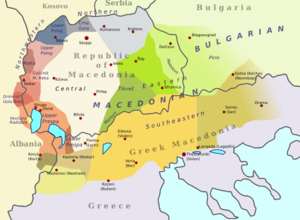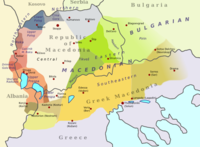| Revision as of 03:40, 22 May 2011 edit203.206.9.81 (talk) →Morphological characteristics← Previous edit |
Revision as of 03:40, 22 May 2011 edit undoClueBot NG (talk | contribs)Bots, Pending changes reviewers, Rollbackers6,438,915 editsm Reverting possible vandalism by 203.206.9.81 to older version. False positive? Report it. Thanks, ClueBot NG. (427549) (Bot)Next edit → |
| Line 9: |
Line 9: |
|
*] word stress (see ]) |
|
*] word stress (see ]) |
|
*the ] has reflexed into {{IPA|}} |
|
*the ] has reflexed into {{IPA|}} |
|
⚫ |
*absence of the intervocalic {{IPA|}} in the plural forms of monosyllabic nouns (e.g. лебо(в)и):<ref> Граматика на македонскиот литературен јазик, Блаже Конески, Култура, Скопје 1967, стр.68</ref> |
|
*absence of the intervocalic {{IPA|}} |
|
|
⚫ |
**{{IPA|}} (→ {{IPA|}}) → {{IPA|}} |
| ⚫ |
** in the plural forms of monosyllabic nouns, e.g. лебо(в)и:<ref>Граматика на македонскиот литературен јазик, Блаже Конески, Култура, Скопје 1967, стр.68</ref> |
|
|
⚫ |
*In the sub-dialect of ]-], especially among older generations, {{IPA|}} replaces {{IPA|/l/}} in some words (for example, {{IPA|}} for {{IPA|/ˈɡlava/}} (''глава'', "head") and {{IPA|}} for {{IPA|/ˈslama/}} (''слама'', "straw")). |
| ⚫ |
***{{IPA|}} (→ {{IPA|}}) → {{IPA|}} |
|
|
** and in most other positions, e.g. то(в)ар:<ref>Историја на македонскиот јазик, Блаже Конески, Култура, Скопје 1986, стр. 21</ref> |
|
|
***{{IPA|}} (→ {{IPA|}}) → {{IPA|}} |
|
|
*In the sub-dialect of ]-], especially among the oldest generations: |
|
| ⚫ |
**{{IPA|}} replaces {{IPA|, e.g. {{IPA|}} for {{IPA| |
|
|
**the etymological {{IPA|}} mutates (raised) to {{IPA|}} ({{IPA|}} ~ {{IPA|}}) when preceding an ] or ] consonant, e.g. {{IPA|}} for {{IPA|}} (''чаша'', "cup") |
|
|
|
|
|
|
==Morphological characteristics== |
|
==Morphological characteristics== |
| Line 23: |
Line 18: |
|
*the third-person personal pronouns: тој, таа, тоа, тие (he, she, it, they) |
|
*the third-person personal pronouns: тој, таа, тоа, тие (he, she, it, they) |
|
*] verbs are typically derived from ] verbs by means of the suffix –ва (e.g. зборва and боледва) |
|
*] verbs are typically derived from ] verbs by means of the suffix –ва (e.g. зборва and боледва) |
|
*'expansion' where other dialects have palatalization: ''падина'' ("to fall", sing. present third-person) versus the standard ''паѓа'') |
|
|
*the use of the inflectional suffix ''-и'' in third-person singular verbs (e.g. ''можи'' and ''биди'' versus the standard ''може'' and ''биде'') |
|
*the use of the inflectional suffix ''-и'' in third-person singular verbs (e.g. ''можи'' and ''биди'' versus the standard ''може'' and ''биде'') |
|
*use of the ] for proper names<ref>Friedman, Victor (1998), Macedonian: Comparative Grammar, Slavic and East European Language Research Center (SEELRC): p. 22</ref> |
|
*use of the ] for proper names<ref>Friedman, Victor (1998), Macedonian: Comparative Grammar, Slavic and East European Language Research Center (SEELRC): p. 22</ref> |
|
*no distinction between masculine and feminine short possessive pronouns, i.e. consistent use of ''му'' and ''го'' for both genders and also the plural third person |
|
|
|
|
|
|
==Typical Words== |
|
==Typical Words== |
The phonological characteristics of the Bitola-Prilep dialect which also can also be found in the other peripheral dialects are:

